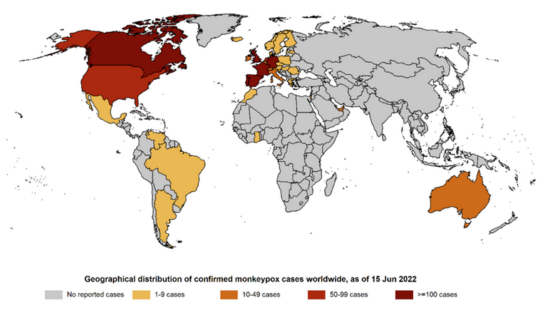Walgreens’ interesting plans, Black Death starting point, the push for OTC birth control, and more
17 Jun 2022
Posted by Andrew Kantor
Let’s hold PBMs accountable
Paraphrased from our friends at NCPA:
The Senate Commerce Committee is scheduled to mark-up S. 4293, the Pharmacy Benefit Manager Transparency Act of 2022, on Wednesday June 22. It would prohibit several abusive PBM practices, and grant the FTC and state attorneys general the ability to penalize and/or initiate legal action against PBMs in the commercial health insurance market. (Here’s NCPA’s one-page PDF overview of 4293.)
NCPA is asking pharmacists to reach out to members of the Senate Commerce Committee and urge — nay, demand — they support the bill.
We’re lucky: Georgia has a guy on the commitee — Raphael Warnock. Call his office (770-694-7828), email him (senator@warnock.senate.gov), surprise him with a fax (770-953-2678), or use the contact form on his website.
If that’s too much for you, NCPA has a one-click online tool. (But really, a personal message is best.)
Genetics ups and downs
The universe giveth, and the universe taketh away.
Giveth: Some people have gene variants that lowers their LDL cholesterol, as if they were taking statins.
Taketh away: People who have those variants are at higher risk for cataracts. That’s what those shifty Danes found when looking at records of British people who had mutations of the HMGCR gene.
Compared with non-carriers, carriers of these rare mutations were more than four-and-a-half times as likely to develop cataracts and over five times as likely to have cataract surgery.
Migraine med works (says the company)
Allergan (now Abbvie) reports that its Qulipta* migraine med works a treat. It’s what a group of American and Spanish researchers found in a clinical trial done on behalf of the company.
About 56 to 60% of people taking it had their migraine days cut in half. (While not even 30% of the poor sops who got placebos saw that kind of reduction.) And almost 8% got rid of migraines completely.
Grain of salt: It comes from the company itself. Less salty: It appears to be part of the testing and approval process.
* If you can’t pronounce it — koo-LIP-ta? kwill-IP-ta? — just say “atogepant.”
OTC birth control?
The American Medical Association is the latest group to call on the FDA to make oral contraceptives available over the counter, sans age restriction.
The American College of Obstetricians and Gynecologists made such a request back in 2019, and two smaller drug makers (Cadence Health and HRA Pharma) have indicated they’ll apply for OTC status.
Elsewhere: It’s already available without a prescription in North Carolina.
Another fact of life
Long Covid could join the family — The family, that is, of “conditions people have to live with” ranging from acne and seasonal allergies to lactose intolerance and chronic pain.
A bare minimum of 25 million Americans have some symptoms of long Covid, and there’s no telling how long they’ll last (the symptoms, that is), and what effect it will have on the healthcare system. But the Atlantic is always there with a glass-half-empty view:
Indeed, if—as these numbers suggest—one in six Americans already has long COVID, then a tidal wave of suffering should be crashing down at this very moment, all around us.
Bonus: It refers to long Covid as a “Mass Deterioration Event.”
What Walgreens will be doing with patient data
Walgreens has announced that it’s launching a “clinical trial business.” Not that it will be running trials — rather, it plans to help recruit under-represented groups to participate.
It explains with a bit of obtuse marketing speak:
With Walgreens patient reach and access to an extensive foundation of pharmacy and patient-authorized clinical data, the company can proactively match diverse patient populations to trials across a range of disease areas based on race, gender, socioeconomic status and location.
What it means: We know who you are, we know what conditions you have, so we’re going to start recruiting you for trials. Legally, of course — the process is “compliant, validated and secure.”
And this bit:
[W]e can provide another offering for patients with complex or chronic conditions in their care journey*, while helping sponsors advance treatment options for the diverse communities we serve.
What it means: We might be able to help patients find new treatments, but we’ll certainly get paid for finding test subjects.
* Really?
Monkeypox and sweet, sweet love
Monkeypox, the WHO says, might be transmitted by close contact — meaning really close contact. Closer. Closer.
World Health Organization officials from the European region said they were investigating whether reports from Germany and Italy — which showed a small number of patients had monkeypox DNA in semen samples — mean the disease could be transmitted through sexual intercourse.
The major takeaway is that even people without the signs of the pox (do we really need to remind you?) can be contagious. “Clean on the streets, poxy in the sheets.”
Fingers crossed and wood knocked: So far there have been no deaths, just a lot of really disgusted people.

Cool non-pharma science story of the day: the Plague
If you chose the Kyrgyzstan square in the game of “Where Did the Black Death Originate?” congrats! German archaeogeneticists (!), spurred on by Scottish historians, found genetic evidence of a ‘precursor’ strain of Yersinia pestis in 10 graves in the Kyrgyzstan village of Kara-Djigach.
(The Scot had noticed the dates on the graves — 1338 and 1339 CE — and that the person had died of “pestilence.” The Black Death hit Europe in 1347.)
“[I]t’s really like the big bang . . . of plague that we have there; the strain that gave rise to the majority of strains that are circulating in the world today.”


